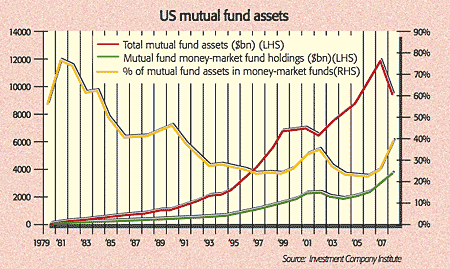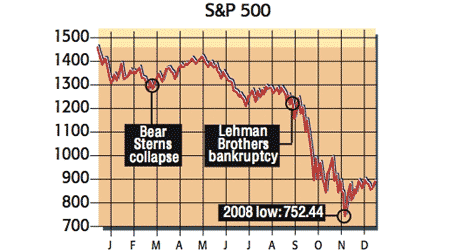Get the latest financial news, insights and expert analysis from our award-winning MoneyWeek team, to help you understand what really matters when it comes to your finances.
You are now subscribed
Your newsletter sign-up was successful
Want to add more newsletters?

Twice daily
MoneyWeek
Get the latest financial news, insights and expert analysis from our award-winning MoneyWeek team, to help you understand what really matters when it comes to your finances.

Four times a week
Look After My Bills
Sign up to our free money-saving newsletter, filled with the latest news and expert advice to help you find the best tips and deals for managing your bills. Start saving today!
"No one is calling for another down year in equities," says David Rosenberg of Merrill Lynch. The consensus among 12 top strategists is for the S&P 500 to be at 1,045 by year end, up 16%. "We had this exact same situation a year ago when the forecast was 1,640. It closed at 903 the experts as a group were only off by 45%."
"Bulls point out how cheap stocks have become," says Kopin Tan in Barron's, which compiled the survey. With more than 37% of mutual fund assets parked in money-market funds (see chart), the highest level since 1991, "there's ample cash for bargain hunting should stocks dip below a certain threshold". Falling energy costs, a gradual credit market thaw and aggressive government action to support the economy are also widely cited as reasons to be cheerful. Meanwhile, expectations are at extreme lows, with safety paramount, says Jason Trennert of Strategas Research, one of the most bullish analysts (with a target of 1,100). "People are practically paying the government to hold their money if that's not a sign of negative sentiment, I don't know what is."
Extremely depressed valuations
That said, few expect the road to higher ground to be easy going. "Corporate earnings will clearly continue to be under pressure," say analysts at BNY Mellon. But valuations seem to be pricing in "a deep and prolonged recession". However, economists' forecasts "range between a mild and a deep recession but nothing out of the ordinary". Investors have "overreacted": this is an opportunity for long-term investors to begin building positions in US equities.
MoneyWeek
Subscribe to MoneyWeek today and get your first six magazine issues absolutely FREE

Sign up to Money Morning
Don't miss the latest investment and personal finances news, market analysis, plus money-saving tips with our free twice-daily newsletter
Don't miss the latest investment and personal finances news, market analysis, plus money-saving tips with our free twice-daily newsletter
America's emergence from the crisis will also buoy the Japanese market, says Shinichi Ichikawa of Credit Suisse: the Topix could reach 1,200 by the end of the year, a gain of 40% from now. Similarly, Eurozone markets should start to look ahead to recovery in due course, meaning "there will be a time in 2009 to aggressively buy cyclicals", says Christian Gattiker of Bank Julius Baer although there is a risk they could go sharply lower in the near-term. Even in Britain, which faces "a very tough time in 2009", valuations are at an "extremely distressed level" and equities are "looking extremely cheap on a three to five-year view", says Richard Buxton of Schroders.

And most of the ones who got it right are still resolutely gloomy: Nouriel Roubini expects "a recession throughout 2009" and a weak 2010, he tells the FT. Equities have "another 15-20% downside risk".
Ready to rally
Still, few bears expect an immediate plunge. "The beginning of 2009 will be marked by more of a relief rally as stockmarkets welcome an explosion of policy initiatives from the incoming Obama administration," says Christopher Wood of CLSA. Even if the more extreme predictions come true and this is a depression, there's scope for a substantial rally, says John Authers in the FT.
After widespread panic in 1931 (for which read 2008), 1932 saw a huge rally, up 111% in two months as "optimism suddenly took hold that the economy was improving". Of course, a sharp sell-off followed as it became clear things were still grim although stocks never returned to their earlier lows. "Could this be repeated in 2009?" Maybe, although stocks are not yet as cheap as they were in 1932. A further "drastic sell-off" to levels "where investors are widely convinced that they are cheap" may be necessary to set us up for a really sustainable rally.
The big picture: the S&P's miserable milestones

The S&P 500 failed to finish above its December 2007 close on a single day in the past year something that's only happened twice before in the index's history, in 1977 and 1962. All told, it lost 38.5% in 2008, the third-worst January-December return after 1937 (down 38.6%) and 1931 (down 47.1%). Only 29 stocks showed gains on the year and many of them were takeovers; discount store Family Dollar (up 35.6%) was the best performer still listed. The worst performer that wasn't bankrupted, taken over or bailed out by the government was shopping mall operator General Growth Properties (down 96.9%).
Statistic of the week
Luxury goods may not be quite as recession proof as optimists in the sector have been claiming.American luxury-goods sales dropped a staggering 34.5% year-on-year this Christmas, according to MasterCard. Electronics sales were off 27% and women's clothing down 23%. Online sales fared best, down just 2% but that still feels pretty painful for internet retailers, when compared with a 22.4% rise last year.
Get the latest financial news, insights and expert analysis from our award-winning MoneyWeek team, to help you understand what really matters when it comes to your finances.
MoneyWeek is written by a team of experienced and award-winning journalists, plus expert columnists. As well as daily digital news and features, MoneyWeek also publishes a weekly magazine, covering investing and personal finance. From share tips, pensions, gold to practical investment tips - we provide a round-up to help you make money and keep it.
-
 How a ‘great view’ from your home can boost its value by 35%
How a ‘great view’ from your home can boost its value by 35%A house that comes with a picturesque backdrop could add tens of thousands of pounds to its asking price – but how does each region compare?
-
 What is a care fees annuity and how much does it cost?
What is a care fees annuity and how much does it cost?How we will be cared for in our later years – and how much we are willing to pay for it – are conversations best had as early as possible. One option to cover the cost is a care fees annuity. We look at the pros and cons.

